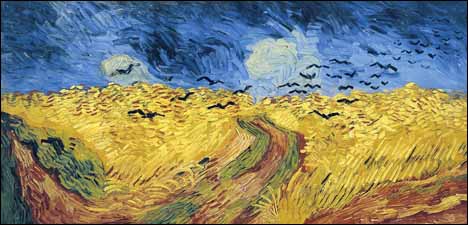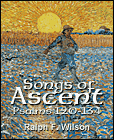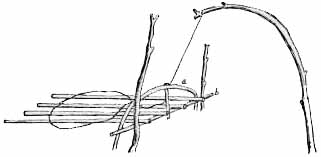
|
Old Testament
New Testament
Gospels
Acts
Paul's Letters
General Letters
Revelation
Topical Studies
Beginning the Journey (for new Christians). en Español

|
Old Testament
New Testament
Gospels
Acts
Paul's Letters
General Letters
Revelation
Topical Studies

|
Home
Bible Studies
Articles
Books
Podcasts
Search
Menu
Donate
About Us
Contact Us
FAQ
Sitemap
5. Psalm 124. God Is Our Help in Trouble
 Vincent Van Gogh, 'Wheatfield with Crows' (1890), 20 x 41 in, oil on canvas, Van Gogh Museum, Amsterdam. |
Some people see themselves as self-made men or self-made women. They brag about their hard work and their cleverness. They exalt themselves.
David, however, was different. He understood that it was God who had given him gifts as a leader. And his victories and escapes were not just luck or due to his skill, but God himself looking out for him -- Yahweh's salvation. This psalm of thanksgiving is attributed to David himself.55
"A Song of Ascents. Of David.
1 If it had not been the LORD who was on our side --
let Israel now say --
2 if it had not been the LORD who was on our side
when people rose up against us,
3 then they would have swallowed us up alive,
when their anger was kindled against us;
4 then the flood would have swept us away,
the torrent would have gone over us;
5 then over us would have gone the raging waters.
6 Blessed be the LORD,
who has not given us as prey to their teeth!
7 We have escaped like a bird from the snare of the fowlers;
the snare is broken, and we have escaped!
8 Our help is in the name of the LORD,
who made heaven and earth." (Psalm 124:1-8, ESV)
David Is Chased by Saul
When we come upon a psalm attributed to David, trying to figure out the incident of his life that prompted this psalm and these insights is almost irresistible. And so we look for clues like this one:
"Blessed be the LORD,
who has not given us as prey to their teeth!
We have escaped like a bird from the snare of the fowlers;
the snare is broken, and we have escaped!" (Psalm 124:6-7)
There are two periods of David's life where he was being chased like prey. First, when jealous King Saul pursues him (1 Samuel 18-27). Later, when David's own son Absalom "steals the heart of the men of Israel," turns them against David, and then tries to hunt him down so he can reign as undisputed ruler of Israel in place of his father (2 Samuel 14-18).
Perhaps the psalmist here is the older David, recalling both periods of his life when he is on the run. But I'm inclined to see this psalm fitting better into the period when Saul is chasing David throughout the rugged hill country of Judah, since the psalm speaks of narrow escapes.
You know the story. David defeats Goliath and goes on to have an outstanding military career. The women of Israel sing of the handsome young warrior:
"Saul has slain his thousands,
and David his tens of thousands." (1 Samuel 18:7)
Though David is completely loyal to Saul, "the Lord's anointed," Saul becomes insanely jealous and seeks to kill him. Saul plots to capture him in his own house, but he escapes out a window and runs for the hills, beginning a years-long ordeal of hiding and running. He and his men find a cave or rocky fastness in the Judean hills, only to have someone report the location, forcing them to move. Sometimes Saul brings out his whole army against David. This goes on and on until Saul is killed in battle with the Philistines.
The Lord Is on Our Side (Psalm 124:1-2a)
"1 If it had not been the LORD who was on our side
--
let Israel now say--
2 if it had not been the LORD who was on our side...." (Psalm 124:1-2a)
Perhaps David's escapes from Saul provide the historical context of the psalm. But whatever its context, the phrase "let Israel now say..." indicates its use as a Israelite community psalm to remember all the times the people have been in danger and have seen the Lord deliver them.
If Yahweh had not been "on our side," more literally, "for us,"56 when people rose up against us, we would have been destroyed. This thought is echoed elsewhere.
"The LORD is on my side; I will not fear.
What can man do to me?" (Psalm 118:6)
"What then shall we say to these things?
If God is for us, who can be against us?" (Romans 8:31)
There is a danger, of course, in assuming that God is "on your side." History is replete with leaders who have wrapped their cause in the cloak of religion as a pretext to annihilate armies of other Christian nations. We humans have an ugly way of justifying our sins. It is much better to ask, "Am I on God's side?"
Threat and Peril (Psalm 124:2b-7)
"2b ... When people rose up against us,
3 then they would have swallowed us up alive,
when their anger was kindled against us;
4 then the flood would have swept us away,
the torrent would have gone over us;
5 then over us would have gone the raging waters." (Psalm 124:2b-5)
|
|
David describes his enemies as:
- Attacking.57 His enemies physically rise up and attack against him and his comrades (verse 2b).
- Angry. His enemies' anger burns against him and his followers (verse 3b).
- Trapping by stealth. David talks about escaping from a trap, such as "the snare of the fowlers," a trap for birds, which were commonly captured for food in Bible days. It appears that David and his men had almost been captured.
He also uses several metaphors to describe the extent of their deadly perils.
- "Swallowed alive" would suggest being consumed by a ravenous animal.
- "Engulfed" or "swept over," and "swept away" suggests being drowned and carried away in a flash flood or tsunami.58
- "Prey to their teeth" comes back to the metaphor of his enemies as ferocious beasts.
David has described a life-and-death series of close calls and escapes,59 but in verse 7 he exults in the Lord's deliverance.
"We have escaped like a bird from the snare of the fowlers; the snare is broken, and we have escaped!" (Psalm 124:7).
It has been a scary, dangerous time, but the Lord has prevailed and rescued David and his band. Praise God!
Our Help Is in the Name of Yahweh (Psalm 124:8)
The psalmist concludes this short psalm with a resounding declaration.
"Our help is in the name60 of the LORD,
who made heaven and earth." (Psalm 124:8)
"Help" is the noun ʿēzer, "help," from a verb that often refers to military help or assistance.61 We saw something very similar in Psalm 121:2 on Day 2. Yahweh is not some weak national god. He is the Creator of all!
"My help
comes from the LORD,
who made heaven and earth." (Psalm 121:2)
Indeed, "Help" and "Helper" are some of the beloved titles of God in the Psalms and elsewhere.
"To you the helpless commits himself;
you have been the helper62
of the fatherless." (Psalm 10:14b)
"But you, O LORD, do not be far off!
O you my help,63 come quickly to my aid!" (Psalm 22:19)
"You are my help64 and my deliverer;
do not delay, O my God!" (Psalm 40:17b)
"Behold, God is my helper;65
the Lord is the upholder of my life." (Psalm 54:4)
"The Lord is my helper;66
I will not fear;
what can man do to me?" (Hebrews 13:6, quoting Psalm 118:6)
Often I hear people quote the proverb, "The Lord helps those who help themselves," as if it were in the Bible. It isn't!67 No, the Lord helps those who look to him in trust for deliverance and then are obedient to do as the Lord shows them. He is our Helper, our Protector, our Deliverer, but not our servant. Rather, we are his servants, and because of that he takes responsibility to look out for us.
Our Savior
We can be threatened by dangerous enemies who seek to do us grievous harm. But when God is on our side, when he is looking out for us, he can fully and completely deliver us, even though our enemies are stronger than we are. He is our Savior, our Rescuer when no one else can help.
One day a baby is born in Bethlehem. Joseph names him "Jesus" (which means, "salvation") because an angel has told him, "He will save his people from their sins" (Matthew 1:21). This baby grows up to be a man, who declares, "The Kingdom of God is at hand." The religious authorities feel threatened and make sure that he is killed, destroyed. But in God's plan, this Jesus-boy is sent to earth to be a "ransom" for the sins of all (Mark 10:45).
This Jesus is our Savior, our Deliverer, the One who is our Helper, when we could not help ourselves. God is on our side!
"For God so loved the world, that he gave his only Son, that whoever believes in him should not perish but have eternal life." (John 3:16)
No matter what crisis you face, my friend, he is there to deliver you. Hallelujah!
Prayer
 Available in paperback, PDF, and Kindle formats. |
Lord, thank you that you have decided to be our Protector, our Helper. If it weren't for you delivering us from our sins, where would we be? Thank you! Thank you for caring about us. Thank you for humbling yourself to come as a man to take our place on the cross. Thank you for rising from the dead on our behalf. Thank you, Jesus. Amen!
Meditation
Day 5 Meditation (Psalm 124). Think back on your own life. In what circumstances have you seen God deliver you from danger from others? Even from danger from yourself? How do you explain God's undeserved love toward you? What undeserving person comes to mind who can be the object of your love and mercy? https://www.joyfulheart.com/forums/topic/1904-5-help/
Endnotes
[55] See the Introduction for more about psalms attributed to David.
[56] "If ... had not" (ESV) is lûlēʾ, "if not, unless." It marks two types of potential clauses: "perhaps" clauses and conditional clauses. "On our side" (ESV, NRSV, NIV, KJV) is lanû, the preposition lê + the first person plural pronoun nû, literally "to us." This is a rare instance where The Message is a more literal translation: "If God hadn't been for us...."
[57] "Rose up against" (ESV, KJV), "attacked" (NIV, NRSV) is the common verb qûm + the preposition 'al, "upon, over, against." Qûm (Qal infinitive) means, "rise, arise, stand," here, "rise up with hostility against," or engage in war against (TWOT #1999; Holladay, 316, Qal 3b). Notice that David writes this in the plural -- "us, our" -- perhaps referring to his band of mighty men, or those loyal to him.
[58] "Flood" (ESV, NRSV, NIV) in verse 4 (and "waters" in verse 5) is mayim, literally, "waters" (KJV). "Torrent" (ESV, NRSV, NIV), "stream" (KJV) is naḥalâ, "wadi, torrent," referring to a dry river-bed or ravine which, in the rainy season, becomes a raging torrent (TWOT #1343a). In verse 5 the waters are described as "raging" (ESV, NRSV, NIV), "proud" (KJV). The word is zêdôn, from the verb zûd, with the root idea of "to boil" (TWOT #547c). "Gone over" (ESV, NRSV, KJV), "swept over" (NIV) in verses 4 and 5 is ʿābar, "pass over/by/through, carry or do away" (TWOT #1556). "Our soul" (KJV, nephesh) at the end of verse 4 is in the Hebrew text, but has the idea of "us," not some kind of metaphysical "soul."
[59] "Escape" (twice in verse 7) is the Niphal stem of mālaṭ, "be delivered, escape." The most prominent facet of meaning is of deliverance or escape from the threat of death, either at the hands of a personal enemy (1 Samuel 19:11; 23:13), a national enemy (2 Samuel 19:10), or by sickness (Psalm 107:20; G. Lloyd Carr, TWOT #1198).
[60] The phrase, "in the name of the LORD" uses a Hebraic idiom. "To call one's name" over something signifies ownership, possession, and protection (Walter C. Kaiser, shēm, TWOT #2405). Here, "the name of Yahweh" represents his own presence and personal protection.
[61] Carl Schultz, ʿāzar, TWOT #1598a.
[62] Qal participle of ʿāzar, "help."
[63] "Help" in this verse is ´ĕyālūt, "strength," from ´ĕyāl, "strength." It is translated "strength" by KJV, NIV, and NJB, "help" by the NRSV and ESV. The connotation of help is supported by the Syriac from which this word is probably borrowed. The Ugaritic cognates suggest "strength" (Thomas E. McComiskey, ´ĕyāl, TWOT #79a).
[64] "Help" is `ezrâ, "help, support, assistance" from `āzar, "help, support" (Charles Schultz, TWOT #1598). This is also used in Psalm 27:9 for God.
[65] Qal participle of ʿāzar, "help."
[66] "Helper" is the adjective boēthos, "helpful," here used as a substantive, "helper" (BDAG 180).
[67] The phrase comes from ancient Greek philosophy. Of course, there is truth in it. We shouldn't expect God to do what we should be doing. The Arabs have a proverb, "Trust in God, but tie your camel," about expecting God to do everything for you. We must take responsibility. See Wikipedia.
Copyright © 2025, Ralph F. Wilson. <pastor![]() joyfulheart.com> All rights reserved. A single copy of this article is free. Do not put this on a website. See legal, copyright, and reprint information.
joyfulheart.com> All rights reserved. A single copy of this article is free. Do not put this on a website. See legal, copyright, and reprint information.



 To be notified about future articles, stories, and Bible studies, why don't you subscribe to our free newsletter, The Joyful Heart, by placing your e-mail address in the box below. We respect your
To be notified about future articles, stories, and Bible studies, why don't you subscribe to our free newsletter, The Joyful Heart, by placing your e-mail address in the box below. We respect your